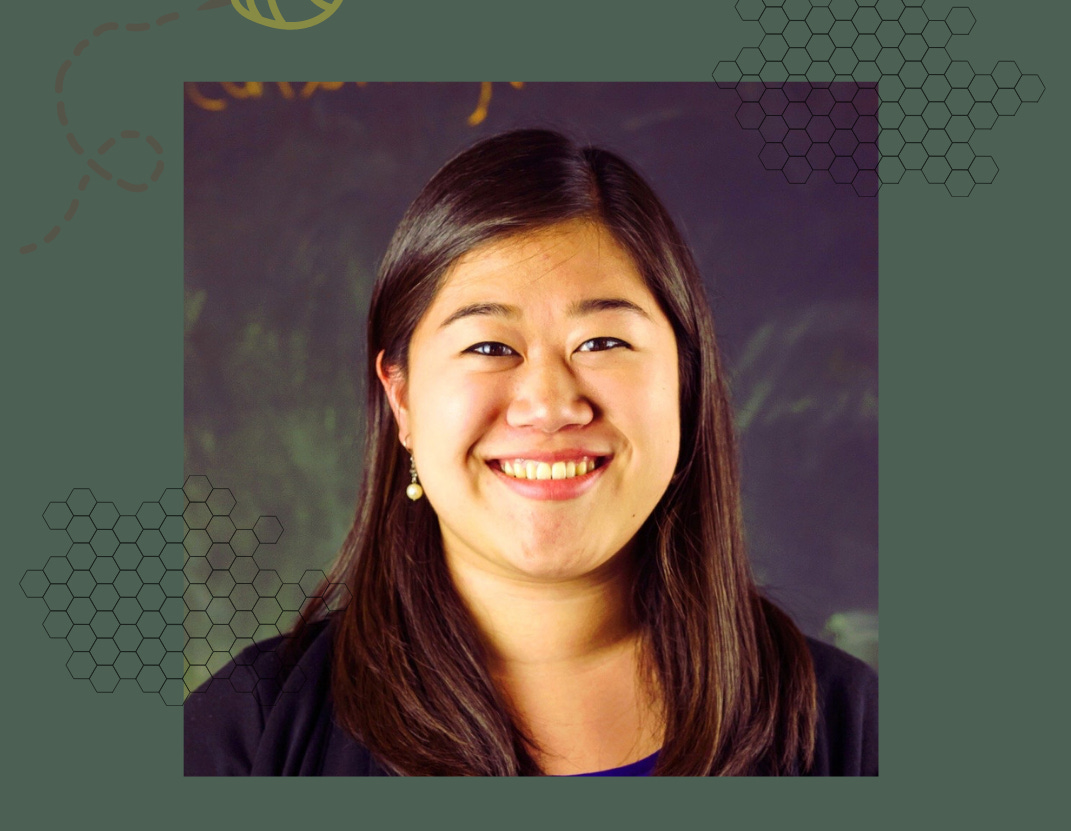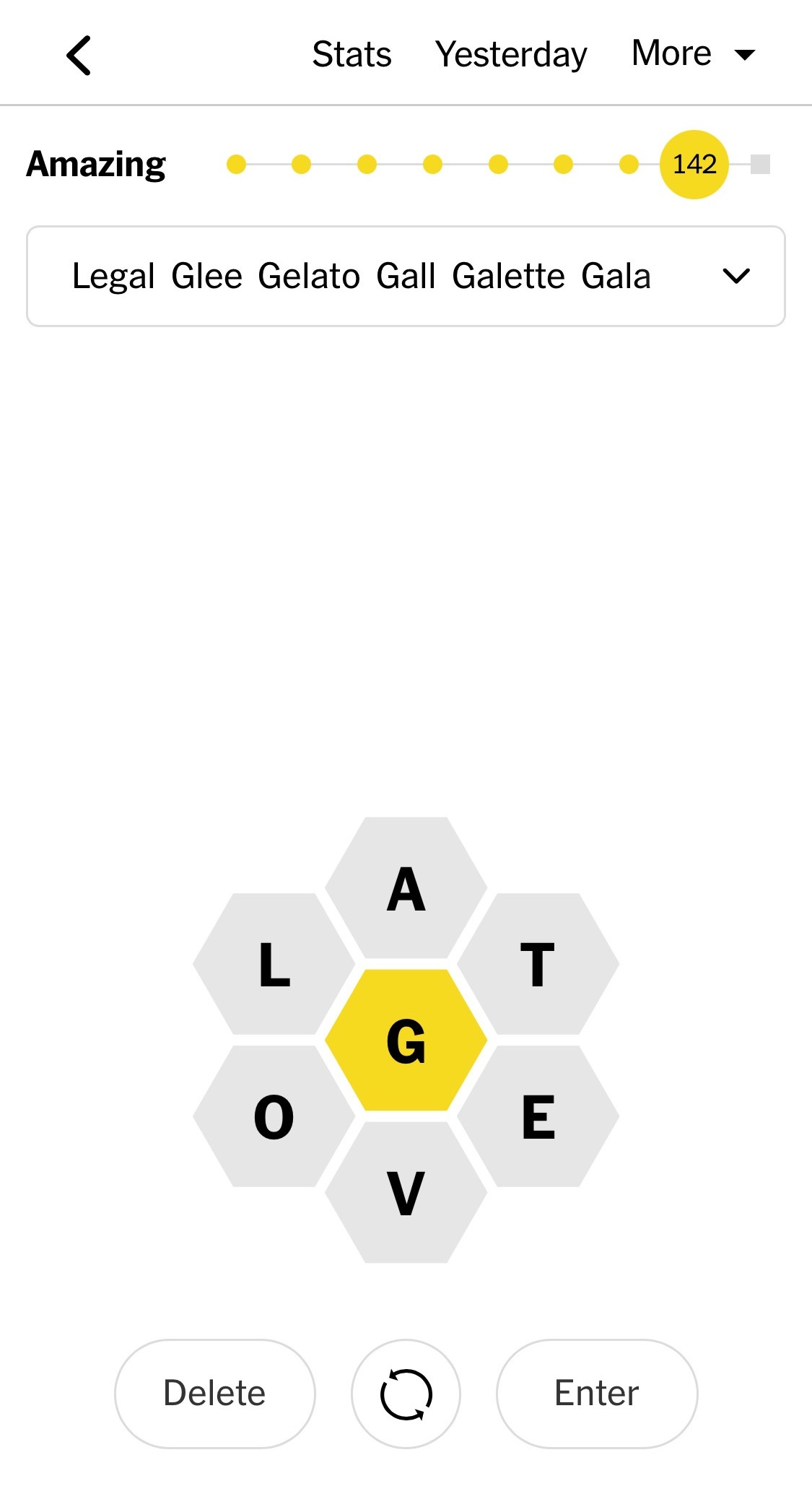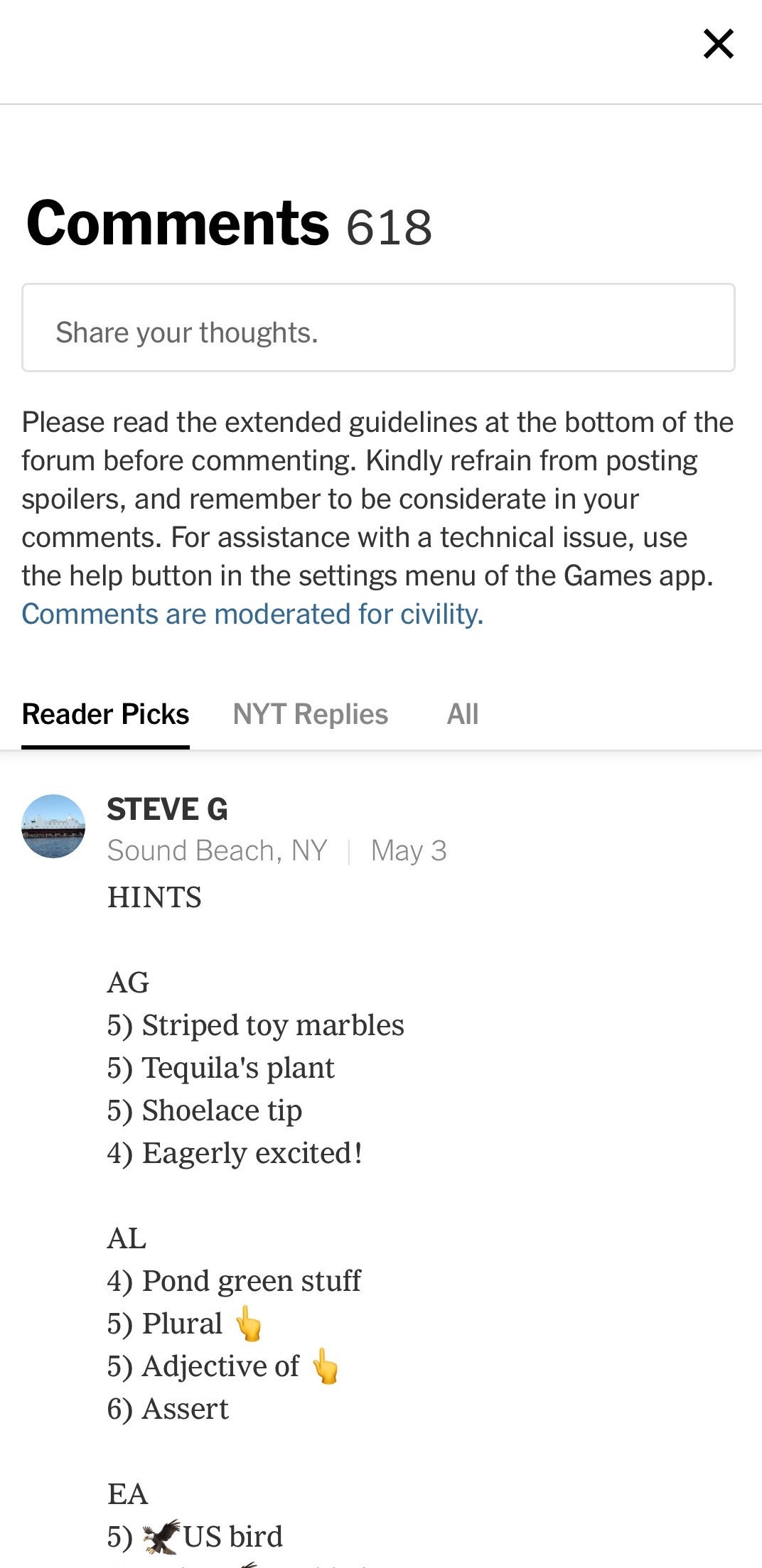Obsessed Interview: Nicole Zhu's NYT Spelling Bee obsession
On the joy of puzzle-solving and the influence siblings have over our obsessions
Today’s Obsessed Interview guest is Nicole Zhu, a writer living in Brooklyn, NY. Nicole and I met virtually during the pandemic at The Resort, an online writing community1.
Nicole’s stories and essays have appeared in Catapult, Eater, Electric Literature, The Lumiere Review, and elsewhere. She also writes an excellent bi-weekly newsletter, nicoledonut, on writing and creativity. I always look forward to reading her essays. From reflections on what AI means for writers to providing writing feedback and lessons learned from shelving a novel manuscript, Nicole’s essays are such an insightful read.
Nicole publishes interviews with fellow creatives as well. I enjoy reading conversations about an artist’s creative process and experiences. Not only do I learn something new, but it’s a way for me to solidify my sense of self as an artist. “Seeing is believing,” some people say, and when I read about someone’s artistic process and accomplishments, it gives me the confidence to own what I want and go for it. It was Nicole’s interview in “Issue 66: Writing an honest graphic novel with Victoria Ying” that inspired me to launch my own interview series.
It was great to catch up with Nicole and chat about her obsession. Let’s dive in!
This interview has been edited and condensed for clarity.
Michelle Béland: Nicole, thank you for speaking with me today about an obsession. What would you like to talk about?
Nicole Zhu: The obsession I'd love to talk about is Spelling Bee. It’s a game invented by Sam Ezersky at the New York Times. It's part of their games app that they’ve released and added to in recent years. They have the crosswords, Wordle and Sudoku now, but I’m specifically very passionate about Spelling Bee. It's a game where there's a center letter that is surrounding a total of seven letters, and every day the letters change. The goal is to try to get as many word combinations as possible from those seven letters. You get a different score based on how many you get in terms of completion. The most coveted is called Queen Bee, obviously, because it means you got all of the possible words. There’s also the concept of pangrams, which are words that use all of the letters on the grid that day. Anyways, that’s the layout of the game and I’m very obsessed.
MB: I've never played this game before. I've never tried Wordle and I'm not very good at crossword puzzles, but Spelling Bee sounds like a fun challenge. When did this obsession start? How often do you play?
NZ: I chose this obsession because it's a pretty recent one but has taken over my life, like for real. I didn't start playing in earnest until this past December, so only a couple of months ago. I, similar to you, was never someone who thought that they would be good at the crossword or really into these word games. Wordle is about as close as I came and I was obsessed with it when it came out. But my sister was really into Spelling Bee–she and I are very close–and we were both home for the Holidays in December. We'd be hanging out in the kitchen and I would be watching over her shoulder on her phone and would see that she was playing Spelling Bee. She asked me if I wanted to play, so she showed me the ropes. It was hard and she knew so many obscure words, so initially it was kind of intimidating. But the game changer was when she gifted me a subscription. It was really nice because then we would do the Spelling Bee puzzle together on the couch and be like, “Oh did you get this word that starts with AG?” And so it became like more of a social game and I actually found the more I played, the better I liked it than Wordle, which was a surprise because I was really into Wordle.
What I really like about it is it doesn't take up that much time. On a good day, I can finish it within five minutes. It’s meant to be short and daily. Spelling Bee is a bit more involved, so I like that it can be a puzzle that I can think about throughout the day. It’s changed my life. I play it every day. I try to go for the second highest ranking, which is Genius. And I try to get all the pangrams. Those are the two things that I aim for every day, because Queen Bee is sometimes elusive to me. It’s literally the first thing I do in the morning. It’s ruined my life because sometimes I’ll be playing Spelling Bee all morning. So that’s the genesis of my obsession.
MB: How do you figure out the puzzle? Do you have a dictionary with you? There must be so many complicated, unknown or less familiar words.
NZ: That is a great question because I also did not really know where to start. You will eventually start to notice patterns. I think that's the biggest thing that helped a lot, but if you're new to the game, there's actually a hints tab you can use. So it shows you how many words there are for different two-letter combinations. For example, it’ll show that there are three words that start with the letters AG. I think that's one of today's. I haven't made Genius yet, because today's puzzle is really hard. I've since expanded, hence the obsession aspect, to using a lot of other tools in the community.
MB: Yeah? What are those tools?
NZ: There's a great website called SBSOLVER.COM where you can customize additional hints. For example, you can get that same two-letter distribution, but they add a third letter. It’s a little bit more information that helps. There’s also a great community section of Spelling Bee as well. There’s this man, Steve G is what we know him by. And there’s another username, Kline. Steve G is the OG. Spelling Bee gets released every day at 3AM Eastern, unlike Wordle which comes out at midnight Eastern. I don’t know why the Times does that, by the way. I don’t know if it’s because someone is based on the West Coast or if they care about the integrity of the puzzle. But there are a couple community members who get up and do the puzzle as soon as it comes out every day and then they post contextual hints with every word letter distribution. So they’ll say “This is a word for a green substance in the ocean.” That was one of today’s words, algae. There’s a whole comment section where they post this every day. It’s a very informal kind of way, but very consistent.
Most recently, the Times released this companion tool called Spelling Buddy, which is pretty neat. It doesn’t live in the app, so you have to open up a separate website, and be logged into your New York Times account and it’ll listen for your updates when you get a word in Spelling Bee. It has all these cool visualizations and tells you which words you’ve gotten, how common are the words you’ve gotten compared to other people who are playing that day and it gives your personalized clues. It’s cool. They’re trying to expand it in an interesting way.
When I’m at my most unhinged playing Spelling Bee I have my phone with the Spelling Bee app, I have the Spelling Bee solver website and I have Spelling Buddy open. I’m just like, give me all of them!
MB: Clearly, you’re passionate about words. Do you find it helps with your writing?
NZ: I haven't figured it out yet. It has definitely done a lot for my vocabulary. But I don't know quite yet how it's going to impact my writing because a lot of the words I've learned are pretty random, like acacia and vanillin, which is the chemical compound that's in vanilla. There’s viol, which is a medieval instrument similar to the violin. Maybe one day I'll write a story about these things, but so far it's been fun to sharpen the vocab.
MB: So it doesn’t necessarily help you with your writing, but you do this almost everyday. It’s like a ritual, right?
NZ: Definitely.
MB: Do you consider Spelling Bee as self-care?
NZ: I would definitely say that. It’s funny. My sister and I joke because we message each other. When you get Genius or Queen Bee they give you a little social image that you can share. And so we always text each other when we get Queen Bee or Genius. We joke that if we haven't done Spelling Bee that day, it's either because we're really depressed, busy or out living life. So it's really interesting because it's like an example of something where, if we don't do it, it either means something really good or really bad. I would say, for the most part, yes, it's definitely a ritual. I really enjoy doing it. I never thought I would ever be someone who’s super into puzzles. I've now expanded into the daily mini crossword. I do the weekly crosswords with the hints on. It’s fun. It keeps the brain sharp in a different way.
MB: Spelling Bee sounds like a point of connection between you and your sister. Kind of like a way to communicate with each other?
NZ: Yes. She's the only person that I know in my life who's as obsessed with it as me. She’s the person who got me into it in the first place. It’s a nice way to chat. I saw that article in the Times that was talking about parallel play. It’s about the fun of hanging out in the same room as someone and you each doing your own thing. So there will be times on the weekend–she lives in New York as well–when we’re both sitting on the couch and we’re both playing Spelling Bee. It's a really good way for us to just check in with each other every day.
MB: I think it's a really special thing that you have someone to share an obsession with, especially your sister.
NZ: That's so true. It's a good way to put it. That's kind of been an interesting theme in our relationship. She's the older sibling and I’m the younger sibling, so I feel like I've been really molded by my sister's obsessions over the course of my life. This is just the latest one. It’s really nice to have someone who really gets it.
Thank you so much for sharing your Spelling Bee obsession, Nicole!
Here’s where you can find Nicole:
See you next week.
The Resort is an online writing community. It’s a fantastic place for community, connection and workshops. Membership is free and open to all writers.







Very interesting and very obsessed Nicole and Michelle!! I think that Spelling Bee and what may appear as being the acquisition of or recalling random vocabulary is vitamins for your imagination and writing craft, much like random images appearing in dreams. I am sure that the images that are conjured up in your mind as you are searching for words will eventually return in a piece of writing.
On puzzles: have you seen the detective series "Astrid and Raphaelle"? Astrid loves to solve all sorts of puzzles and oftentimes, she will apply her strategies to the murder cases. Not only does she solve disentanglement or mechanical puzzles during the show, she also explains the origin and the history of the puzzles. I find that very interesting.
Aaaaaaah! 2 of my faves in conversation. Brilliant!